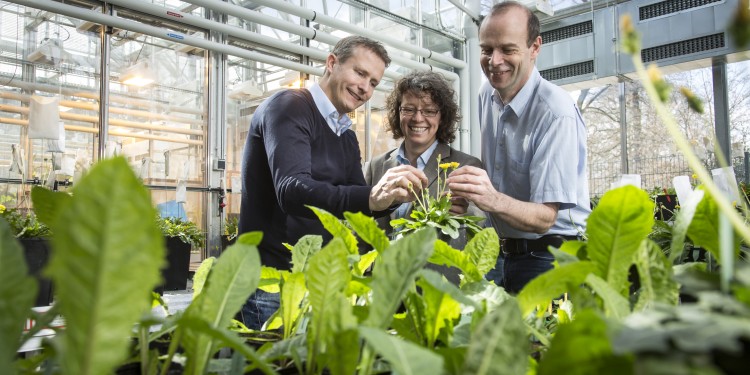
Rubber from dandelions
In a joint project between scientists of the Fraunhofer Institute for Molecular Biology and Applied Ecology IME, the Department of Biology and Biotechnology (IBBP) at the University of Münster and the tire manufacturer Continental, all prerequisites for a sustainable use of Russian dandelion as an alternative rubber resource were established, and first car tire prototypes have been produced. For their work and its application as a source of natural rubber, Prof. Dirk Prüfer and Dr. Christian Schulze Gronover of IME and IBBP as well as Dr. Carla Recker of Continental receive the 2015 Joseph von Fraunhofer Prize today at the annual meeting of the Fraunhofer Gesellschaft in Wiesbaden, in the presence of German Federal President Joachim Gauck and the Premier of Hesse, Volker Bouffier.
The milky sap of the dandelion shows similarities to that of the rubber tree, and most importantly contains caoutchouc - the raw material for rubber production. »The plant is extremely resilient, able to grow in moderate climates and even in soil that is not or just barely suited for the cultivation of food and feed crops«, explain scientists Christian Schulze Gronover and Dirk Prüfer. However, common dandelion – a plant species native to Germany – does not provide enough rubber for being utilized on industrial scale. In order to increase the yield, the researchers have focused on the Russian dandelion that already produces significant amounts of rubber in its roots. With their team, Dirk Prüfer and Christian Schulze Gronover have identified genes that promote the production of rubber – or impede it, respectively.
Natural rubber from dandelions -
Yields improved by conventional breeding
Based on these results, they were able to develop plants with higher rubber yields. In addition, they succeeded in extracting several kilos of dandelion rubber with a small pilot processing plant, now building the ideal platform for developing rubber extraction facilities on industrial scale.
Together with the tire manufacturer Continental, they developed tire prototypes made of dandelion rubber. The result is very attractive in both technical and ecological terms: The cultivation of Russian dandelions on marginal soils will not compete with food crops for available arable land and will help to protect tropical rainforests that may be replaced by rubber tree plantations to meet future growing demands for the natural resource. What’s more, manufacturer Continental has tested the performance of prototype tires under dry, wet and winter conditions. They have proven effective: »The dandelion natural rubber has ideal material properties. The tires are equivalent to those made from the rubber tree«, says Dr. Carla Recker of Continental. – And there are many other possible applications: Whether mattresses, gloves, tape, technical rubber articles or tires – about 40 000 products of our daily lives contain natural rubber.
Joseph von Fraunhofer Prize – about the award
Since 1978, the Fraunhofer Gesellschaft annually honors outstanding scientific achievements. Until now, more than 200 researchers have received the Joseph von Fraunhofer Prize for solving application-oriented problems. This year, three such prizes of 50 000 Euro each will be awarded, and Prof. Dirk Prüfer, Dr. Christian Schulze Gronover and Dr. Carla Recker contributed to one prize.
